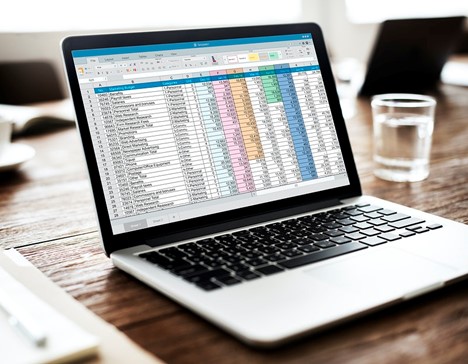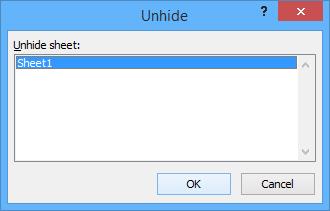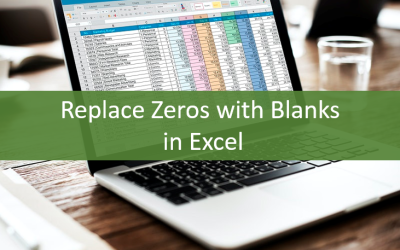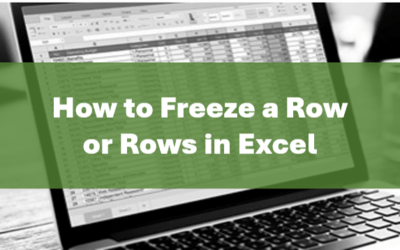Hide or Unhide Excel Worksheets
by Avantix Learning Team | Updated September 14, 2023
Applies to: Microsoft® Excel® 2010, 2013, 2016, 2019, 2021 and 365 (Windows)
You can hide or unhide Excel worksheets using the Ribbon, the right-click menu or keyboard shortcuts. If you hide worksheets, you can still reference them in other worksheets or workbooks. If you have Excel 365, you can now quickly unhide multiple worksheets or all worksheets. If you have trouble hiding or unhiding a worksheet, protection may have been enabled or a user has used VBA (Visual Basic for Applications) to hide the sheet.
Recommended articles: How to Hide Excel Formulas from Clients, Colleagues and Other Users
Do you want to learn more about Excel? Check out our virtual classroom or in-person classroom Excel courses >
The following are several methods to hide or unhide worksheets in Excel.
Hide a worksheet by right-clicking
To hide a worksheet in an Excel workbook by right-clicking:
- Right-click the worksheet tab that you want to hide.
- From the drop-down menu, choose Hide.
Hide a worksheet tab using the Ribbon and a mouse
To hide a worksheet in an Excel workbook using the Ribbon and a mouse (or track pad):
- Select the worksheet that you want to hide.
- Click the Home tab in the Ribbon.
- In the Cells group, click Format. A drop-down menu appears.
- In the drop-down menu, under Visibility, select Hide & Unhide and then choose Hide Sheet.
Below is the Cells group in the Ribbon:
Hide a worksheet using the Ribbon and keyboard shortcuts
To hide a worksheet in an Excel workbook using the Ribbon and keyboard shortcuts (key tips):
- Display the worksheet that you want to hide.
- Press Alt. The Ribbon should appear with key tips.
- Press H > O > U > S. This is a sequential shortcut so press each key in order.
Below is the cells group in the Ribbon with key tips displayed:
Unhide a worksheet by right-clicking
To unhide a worksheet by right-clicking:
- Right-click any worksheet tab.
- From the drop-down menu, choose Unhide. A dialog box appears.
- Select the worksheet you want to unhide.
- Click OK.
If Unhide is disabled, there are no hidden sheets.
Unhide a worksheet using the Ribbon and a mouse
To unhide a worksheet in an Excel workbook using the Ribbon and a mouse (or trackpad):
- Click the Home tab in the Ribbon.
- In the Cells group, click Format. A drop-down menu appears.
- In the drop-down menu, under Visibility, select Hide & Unhide, and then choose Unhide. A dialog box appears.
- Click the sheet you want to unhide and click OK.
If Unhide is disabled, there are no hidden sheets.
Unhide a worksheet using the Ribbon and keyboard shortcuts
To unhide a worksheet in an Excel workbook using the Ribbon and keyboard shortcuts (key tips):
- Press Alt. The Ribbon should appear with Key Tips.
- Press H > O > U > H (press H then O then U then H). A dialog box appears.to activate the Home tab.
- Use the up and down arrow keys to select the sheet you want to unhide.
- Press Enter to select OK.
Unhide all worksheets or multiple worksheets
If you have Excel 365, you can now unhide multiple sheets or all sheets:
To unhide all worksheets by right-clicking (or unhide multiple sheets):
- Right-click any worksheet tab. A drop-down menu appears.
- Choose Unhide. A dialog box appears.
- Click the first worksheet and Shift-click the last worksheet if you want to unhide all worksheets. Alternatively, Ctrl-click specific sheets if you want to unhide some of the worksheets.
- Click OK.
You can use this method if you access the dialog box through the Ribbon as well.
This article was first published on January 15, 2015 and has been updated for clarity and content.
Subscribe to get more articles like this one
Did you find this article helpful? If you would like to receive new articles, JOIN our email list.
More resources
How to Merge Cells in Excel (with Shortcuts)
3 Excel Strikethrough Shortcuts to Cross Out Text or Values in Cells
How to Highlight Errors, Blanks and Duplicates in Excel Worksheets
How to Replace Blank Cells with a Value from the Cell Above in Excel
Related courses
Microsoft Excel: Intermediate / Advanced
Microsoft Excel: Data Analysis with Functions, Dashboards and What-If Analysis Tools
Microsoft Excel: Introduction to Power Query to Get and Transform Data
Microsoft Excel: New and Essential Features and Functions in Excel 365
Microsoft Excel: Introduction to Visual Basic for Applications (VBA)
Our instructor-led courses are delivered in virtual classroom format or at our downtown Toronto location at 18 King Street East, Suite 1400, Toronto, Ontario, Canada (some in-person classroom courses may also be delivered at an alternate downtown Toronto location). Contact us at info@avantixlearning.ca if you'd like to arrange custom instructor-led virtual classroom or onsite training on a date that's convenient for you.
Copyright 2024 Avantix® Learning
You may also like
How to Replace Zeros (0) with Blanks in Excel
There are several strategies to replace zero values (0) with blanks in Excel. If you want to replace zero values in cells with blanks, you can use the Replace command or write a formula to return blanks. However, if you simply want to display blanks instead of zeros, you have two formatting options – create a custom number format or a conditional format.
What is Power Query in Excel?
Power Query in Excel is a powerful data transformation tool that allows you to import data from many different sources and then extract, clean, and transform the data. You will then be able to load the data into Excel or Power BI and perform further data analysis. With Power Query (also known as Get & Transform), you can set up a query once and then refresh it when new data is added. Power Query can import and clean millions of rows of data.
How to Freeze Rows in Excel (One or Multiple Rows)
You can freeze one or more rows in an Excel worksheet using the Freeze Panes command. If you freeze rows containing headings, the headings will appear when you scroll down. You can freeze columns as well so when you scroll to the right columns will be frozen.
Microsoft, the Microsoft logo, Microsoft Office and related Microsoft applications and logos are registered trademarks of Microsoft Corporation in Canada, US and other countries. All other trademarks are the property of the registered owners.
Avantix Learning |18 King Street East, Suite 1400, Toronto, Ontario, Canada M5C 1C4 | Contact us at info@avantixlearning.ca











